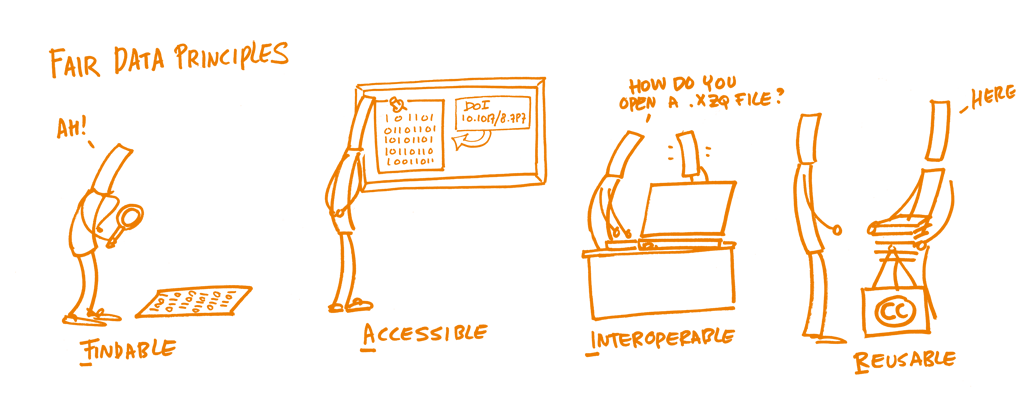"FAIR" Data Principles
biul |

In 2016, an article entitled "The FAIR Guiding Principles for scientific data management and stewardship" , published in Scientific Data, set out four key principles for managing research data: data must be findable, accessible, interoperable and reusable.
The aim is for these principles to serve as a guideline for improving the discovery and re-use of research data by both humans and ‘machines’.
For several years now, research funders such as the European Commission have been aiming to improve access to scientific results, including research data. The FAIR Principles are at the heart of the European Commission's Horizon 2020 and Horizon Europe programmes.
Details of such principles are given below, as well as useful related resources:
Findable: (meta)data should be easily findable by humans and machines, which means that :
F1. (Meta)data are assigned a globally unique and persistent identifier
F2. Data are described with rich metadata
F3. Metadata clearly and explicitly include the identifier of the data they describe
F4. (Meta)data are registered or indexed in a searchable resource
Accessible: Access to the data should be easy (with authentification, or autorizations restriction if needed), which means that :
A1. (Meta)data are retrievable by their identifier using a standardised communications protocol
A1.1 The protocol is open, free, and universally implementable
A1.2 The protocol allows for an authentication and authorisation procedure, where necessary
A2. Metadata are accessible, even when the data are no longer available
Interoperable: Interoperability means allowing data exchange and re-use between researchers, institutions, organisations, countries etc.
To this end, the data must be able to be integrated with other data and be interoperable with applications or workflows for analysis, storage and processing (i.e. by adhering as far as possible to open software applications and format standards, and by facilitating recombination with different data sets from different origins).
I1. (Meta)data use a formal, accessible, shared, and broadly applicable language for knowledge representation.
I2. (Meta)data use vocabularies that follow FAIR principles
I3. (Meta)data include qualified references to other (meta)data
Reusable: reuse of data should be possible. To do so, data should be properly described and documented (in order to be replicated, combined with other, etc.). A clear and accessible licence defines the conditions for re-use.
R1. Meta(data) are richly described with a plurality of accurate and relevant attributes
R1.1. (Meta)data are released with a clear and accessible data usage license
R1.2. (Meta)data are associated with detailed provenance
R1.3. (Meta)data meet domain-relevant community standards
Wilkinson et al. (2016), « The FAIR Guiding Principles for scientific data management and stewardship », Scientific Data, 9p. DOI : 10.1038/sdata.2016.18 https://www.nature.com/articles/sdata201618
(Illustration : Bezjak S., et al., Open Science Training Handbook (1.0), Zenodo, 2018, CC0)